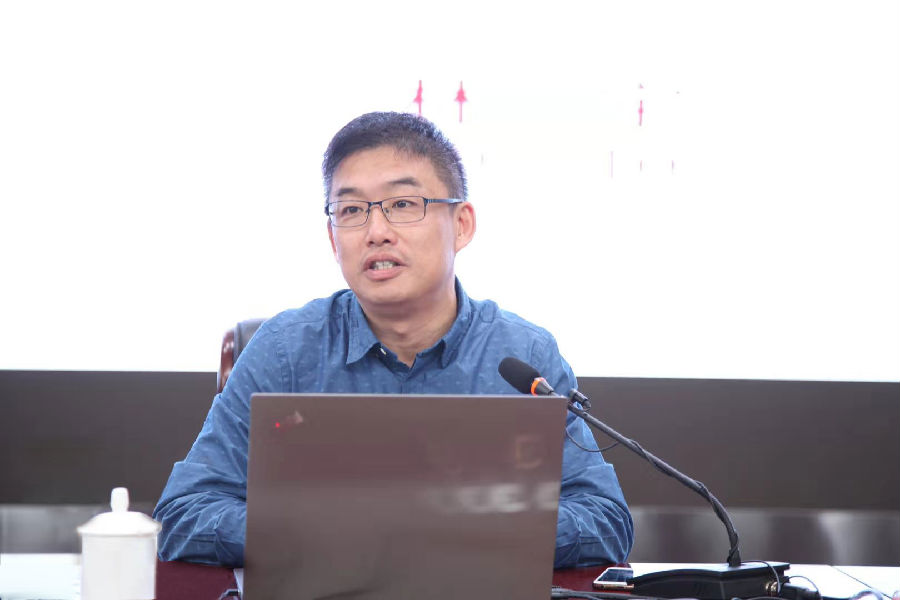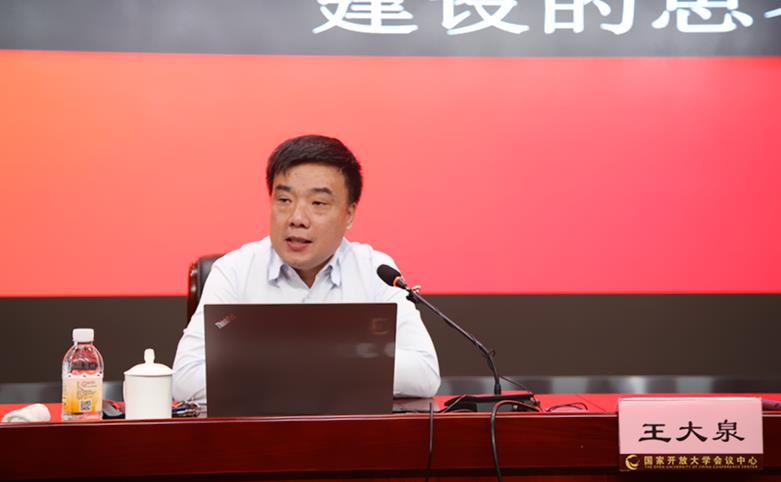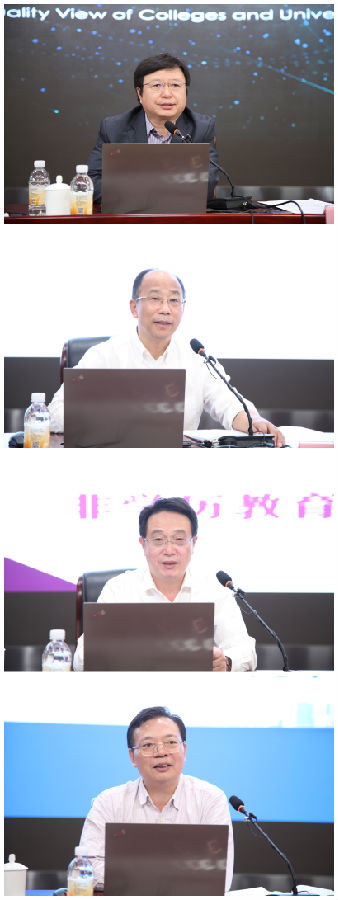 From 10 to 11 October 2019, the OUC 2019 Teaching Working Conference and Third Session of the General Assembly of the OUC School Affairs Committee was held in Beijing.
From 10 to 11 October 2019, the OUC 2019 Teaching Working Conference and Third Session of the General Assembly of the OUC School Affairs Committee was held in Beijing.

At the meeting, Wang Daquan, deputy director of the Department of Policies and Regulations of the Ministry of Education (MOE) was invited to make a report on the construction of the OUC Charter. Jing Degang, director of the OUC School Affairs Committee, made a work report titled "Concentrating on Quality and Focusing on Creating Distinctive Features.” Ju Chuanjin, deputy director and secretary-general of the School Affairs Committee, announced the decision regarding the adjustment of the members of the OUC School Affairs Committee. Lin Yu, vice president of the OUC, gave a report on teaching work. Guo Yongxin, president of Liaoning Branch; Ye Hong, president of Zhejiang Branch; Zheng Hanhua, president of Anhui Branch; and Xiong Jun, president of Guangzhou Branch, gave speeches and exchanged views.

In his report, Jing Degang summarised the main work and achievements of the OUC in the past year, made an in-depth analysis of the current situation, problems, and challenges, and clarified future development ideas and measures to deal with key tasks. He pointed out that over the past year, the OUC has comprehensively strengthened Party construction work. The 40-year anniversary celebration activities have had a far-reaching impact. Education and teaching reform has been gradually deepened, enrolment scale has grown in an orderly manner, the management of learning resources has been further standardised, and informatisation has continued to advance. The credit bank has taken on a heavy responsibility. Poverty alleviation through education has achieved great results. On the whole, work is progressing smoothly, and has achieved remarkable results. The key tasks identified by the School Affairs Committee in 2018 have been largely completed. However, there are still difficulties and challenges ahead in consideration of the external environment and internal issues.
Jing Degang stressed that it is necessary to take Xi Jinping Thought on Socialism with Chinese Characteristics for a New Era as a guide, focus on “China Education modernisation 2035”, maintain the OUC's 40 years of running school experience, proceed from China's national conditions, take root in China, adhere to the principle of nurturing talents through virtue, make the OUC into a world-class open university with Chinese characteristics within the open university system, and become an important pillar for a learning society in China. He stressed that the OUC should focus on building a team that is loyal to the Party's educational cause and that stresses politics, implementation, breakthroughs, and contributions to the country's development. The OUC should enhance two abilities: the ability to identify and apply global teaching resources and the ability to manage and govern "Internet+" education and teaching. We should establish three systems: a network security guarantee system; a quality evaluation and monitoring system; and an innovation-driven development system. Furthermore, we should implement three major strategies: a quality improvement strategy for academic education; a social training development strategy; and a strategy to guarantee the growth of the Open University for Older Adults.
He pointed out that the OUC system should be united in the spirit of reform and innovation; form a fast-responding, Internet-based system of thought that reflects the advantages of the socialist system; and strive to create a blue print for the school system that realises resource sharing, facilities construction, quality co-management, market co-exploration, science and technology construction, cultural prosperity, and a win-win future. In terms of follow-up work, the OUC must mobilise the personnel in the system to make great efforts to enhance the quality of teaching, accelerate the informatisation level, successfully gather, construct, and use learning resources, build strong non-degree education, accelerate the construction of national credit banks for vocational education, and jointly build a scientific research atmosphere for the school-running system. It should also apply for a master's degree conferral station and take measures to enhance the cohesiveness of the school-running system.

Lin Yu, vice president of the OUC, gave a report entitled "Unifying Thoughts with Reasonable Positioning to Run Quality Education.” He pointed out that open education should follow the characteristics of higher education and adhere to the rule of adult learning to provide convenient, flexible, and quality education services with great practicality, famous teachers, reasonable evaluation, and strong guarantees. The OUC should implement a degree education qualifications enhancement strategy, engage in reform and innovation, clarify subject construction and the division of duties and responsibilities, promote curriculum reform on the basis of subject planning, establish a safe and unified online examination system, and rationally deploy and manage the study centres.

The meeting invited Wang Daquan, deputy director of the Department of Policies and Regulations of the Ministry of Education (MOE) to give a lecture entitled "Thoughts on the Construction of the OUC Charter". He pointed out that unlike an ordinary university charter, the OUC Charter has special characteristics. The OUC is first and foremost an educational institution at the national level. It has the functions of system construction and levelled coordination. It is not only a university affiliated to the Ministry of Education, but also undertakes tasks at the national level. As such, it must also reflect the national level. The OUC Charter should further focus on system creation and institutional mechanism innovation, coordinate the relationship between headquarters and branches, and better adapt to the new requirements of accelerating the development of online education and innovative education systems.

Guo Yongxin, president of the Liaoning Branch; Ye Hong, president of the Zhejiang Branch; Zheng Hanhua, president of the Anhui Branch; and Xiong Jun, president of the Guangzhou Branch, gave speeches and exchanged views. Guo Yongxin exchanged views on the quality of open education from the perspectives of effective teaching, scientific research orientation, discipline construction, platform construction, and team building. Taking the ideological and political education work of Zhejiang Branch as an example, Ye Hong shared his views on the understanding, practice, and achievements of building an integrated education system for open universities. From the perspectives of teacher education, professional technical training, and network parks, Zheng Hanhua exchanged his views on how to make non-academic education and social services bigger and stronger, so as to accelerate the transformation and development of schools. Xiong Jun exchanged his views on the practical exploration of elderly education at the Guangzhou Branch with the theme of "New Era, New Journey: Reflections on the Construction of Guangzhou Open University for Older Adults.”
In combination with meeting’s work report, The OUC Charter, Several Opinions on Improving Teaching Quality, and Basic Norms of OUC Teachers' Professional Behaviour, the participating members of the OUC School Affairs Committee held a group discussion, exchanged ideas, and put forward suggestions. Everyone believed that the theme of the meeting is clear, the development goals are inspiring, the research on the issues is correct, and the measures proposed are down-to-earth. The participants reached a consensus on improving the quality of education and teaching and continuously strengthening system construction.
In his summary of the meeting, Jing Degang said that this meeting is aimed at strategy selection meeting, building consensus, and stressing implementation. In accordance with the requirement of "never forgetting our original intentions and keeping in mind the mission" put forward by the Central Government and the Ministry of Education, we must keep our original intentions, undertake our mission, find our shortcomings, stress implementation, take root in China to successfully operate education, and strive to make the OUC a university that is full of vitality, vigour, and respect. In order to successfully implement the spirit of this meeting, we must first focus on our main task and unify our thinking. We should study and implement the spirit of this meeting, carry out ideological discussions, continuously build consensus, clarify work priorities, focus on improving quality, and promote reform and construction work. Second, we should mobilise elites, brainstorm ideas, conduct reform and innovations, and dispatch cadres equipped with high capabilities to develop degree education, social training, and the Open University for Older Adults. Third, we should revitalise our resources and strive to create a strong master's degree conferral station. The OUC and its branches should work together to focus on the application preparations for the master’s degree conferral station, emancipate the mind, reform and innovate, and push the task forward rapidly. Fourth, we should further deepen connotation construction and lay a solid foundation. It is necessary to strengthen overall planning, intensify informatisation construction, learning resources construction, teaching faculty team construction, and examination reform. Fifth, we should target the national strategy and take the initiative to make a plan. We should integrate the strength of the national school-running system, focus on the national strategy to emancipate the mind and take the initiative to open up new fields and new horizons. Sixth, we must be strict with ourselves and maintain a down-to-earth attitude to prevent risks. We should turn the consensus reached at this meeting into a powerful driving force, to change our work style, promote the implementation of the work, and achieving excellent results.
More than 200 people attended the meeting, including leaders of the OUC headquarters and 45 branches, heads of the teaching departments and related management departments, and representatives of industry and corporate colleges.
By Dong Lichao, OUC